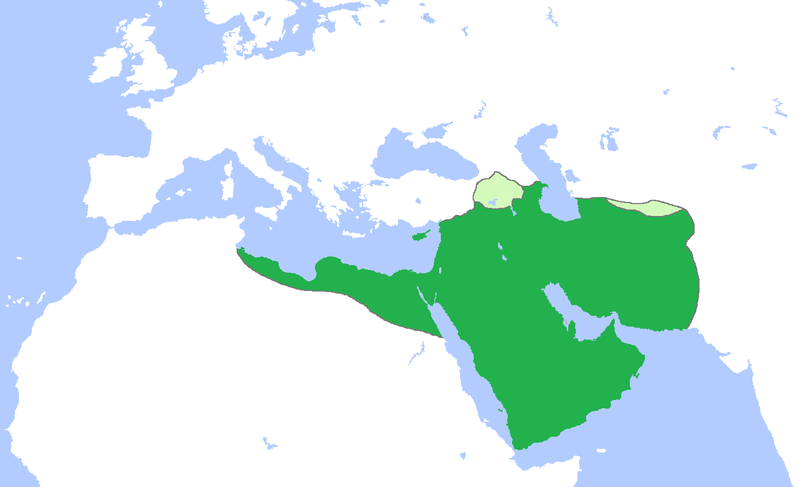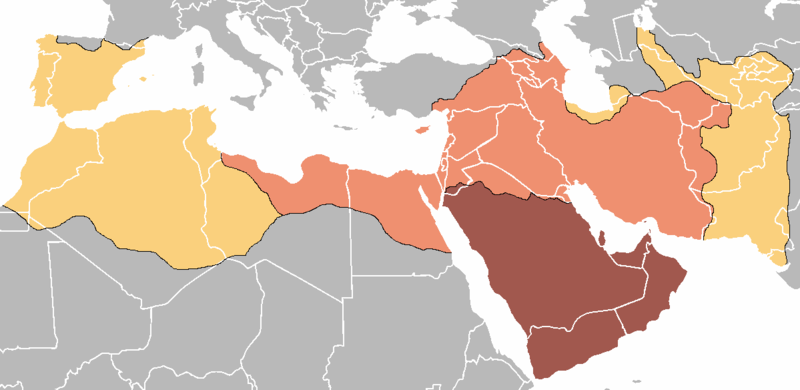|
these days the anniversary of finishing the islamic caliphate >>91 years passed from finishing the caliphate system by the turkish man attaurk after the ottoman state lost at the world war one alot of people in the islamic world want to get the caliphate system of rule again it is abig hope and dream of alot of muslims ..this article narrate little about islamic caliphate>>
The term caliphate, “dominion of a caliph (‘successor’)” (from the Arabic خلافة or khilāfa, Turkish: Hilafet), refers to the first system of government established in Islam and represented the leaders unity of the Muslim Ummah (community). In theory, it is an aristocratic–constitutional republic1 (the Constitution being the Constitution of Medina), which means that the head of state, the Caliph, and other officials are representatives of the people and of Islam and must govern according to constitutional and religious law, or Sharia. In its early days, it resembled elements of direct democracy (see shura) and an elective monarchy.Sunni Islam stipulates that the head of state, the caliph, should be selected by Shura – elected by Muslims or their representatives
The caliph was often known as Amir al-Mu’minin (أمير المؤمنين) “Commander of the Believers”. Muhammad established his capital in Medina, and after he died it remained the capital for the Rashidun period.
According to Sunni Muslims, the first caliph to be called Amir al-Mu’minin was Abu Bakr Siddique, followed by Umar ibn al-Khattāb, the second of theFour Rightly Guided Caliphs. Uthman ibn Affan and Ali ibn Abi Talib also were called by the same title, while the Shi’a consider Ali to have been the first and only truly legitimate caliph.[4]

Umayyads, 7th–8th centuries

Abbasids, 8th–13th centuries
Ottomans, 16th–20th century
Ottoman rulers (generally known as Sultans in the West) were known primarily by the title of Padishah and used the title of Caliph only sporadically. Mehmed II and his grandson Selim I used it to justify their conquest of Islamic countries. As the Ottoman Empire grew in size and strength, Ottoman rulers beginning with Selim I began to claim Caliphal authority.
Ottoman rulers used the title “Caliph” symbolically on many occasions but it was strengthened when the Ottoman Empire defeated the Mamluk Sultanate in 1517 and took control of most Arab lands. The last Abbasid Caliph at Cairo, al-Mutawakkil III, was taken into custody and was transported to Constantinople, where he reportedly surrendered the Caliphate to Selim I. According to Barthold, the first time the title of “Caliph” was used as a political instead of symbolic religious title by the Ottomans was the peace treaty with Russia in 1774.
The outcome of Russo-Turkish War of 1768-1774 war was disastrous for the Ottomans. Large territories, including those with large Muslim populations, such as Crimea, were lost to the Russian Empire. However, the Ottomans under Abdul Hamid I claimed a diplomatic victory by being allowed to remain the religious leader of Muslims in the now-independent Crimea as part of the peace treaty: in return Russia became the official protector of Christians in Ottoman territory.
Around 1880 Sultan Abdul Hamid II reasserted the title as a way of countering Russian expansion into Muslim lands. His claim was most fervently accepted by the Muslims ofBritish India. By the eve of the First World War, the Ottoman state, despite its weakness relative to Europe, represented the largest and most powerful independent Islamic political entity. The sultan also enjoyed some authority beyond the borders of his shrinking empire as caliph of Muslims in Egypt, India and Central Asia.
[edit]End of the Caliphate, 1924
On March 3, 1924, the first President of the Turkish Republic, Mustafa Kemal Atatürk, as part of his reforms, constitutionally abolished the institution of the Caliphate. Its powers within Turkey were transferred to the Grand National Assembly of Turkey, the parliament of the newly formed Turkish Republic. The title was then claimed by King Hussein bin Ali ofHejaz, leader of the Arab Revolt, but his kingdom was defeated and annexed by Ibn Saud in 1925. The title has since been inactive.
Ottoman influence on other nations, such as in India, may have also been lost due to its ending of caliphate
A summit was convened at Cairo in 1926 to discuss the revival of the Caliphate, but most Muslim countries did not participate and no action was taken to implement the summit’s resolutions.
Though the title Ameer al-Mumineen was adopted by the King of Morocco and by Mullah Mohammed Omar, former head of the Taliban regime of Afghanistan, neither claimed any legal standing or authority over Muslims outside the borders of their respective countries.
[edit]

The following Hadith from Musnad Ahmad ibn Hanbal can be understood to prophesy two eras of Caliphate (both on the lines/precepts of prophethood).
Hadhrat Huzaifa narrated that the Messenger of Allah said: Prophethood will remain among you as long as Allah wills. Then Caliphate (Khilafah) on the lines of Prophethood shall commence, and remain as long as Allah wills. Then corrupt/erosive monarchy would take place, and it will remain as long as Allah wills. After that, despotic kingship would emerge, and it will remain as long as Allah wills. Then, the Caliphate (Khilafah) shall come once again based on the precept of prophethood)
|